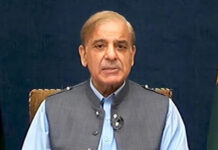NEW DELHI: Three years after the execution of Kashmiri activist Afzal Guru, former Indian Home Minister P. Chidambaram on Thursday said there were “grave doubts about the extent of his involvement” in the 2001 Parliament attack for which he was sentenced to death.
In an interview with the Economic Times published today, Chidambaram, a senior Congress party politician who held the Home and Finance portfolios in the United Progressive Alliance (UPA) government, said Guru could have instead been sentenced to life in prison if there were doubts behind his involvement in the terrorist attack.
“There were grave doubts about his involvement (in the conspiracy behind the attack on Parliament) and even if he was involved, there were grave doubts about the extent of his involvement. He could have been imprisoned for life without parole for rest of his natural life,” he said.
Five armed rebels stormed India’s parliament in New Delhi on December 13, 2001, killing eight police officers and a gardener before they were shot dead by security forces. Guru was found guilty of conspiring with and sheltering the militants who attacked the parliament.
The Kashmiri activist’s execution in Feb 2013 has recently become the topic of debate in India once again following demonstrations in universities across India protesting the arrest of left-wing student leader Kanhaiya Kumar for commemorating the anniversary of Guru’s execution at the Jawaharlal Nehru University.
Kumar was arrested on sedition charges in a case that ignited demonstrations across campuses and sparked a debate on freedom of speech in India. “I think it is possible to hold an honest opinion that the Afzal Guru case was perhaps not correctly decided,” said Chidambaram in his interview.
“But being in government you cannot say the court has decided the case wrongly because it was the government that prosecuted him. But an independent person can hold an opinion that the case was not decided correctly,” he said.
It is wrong to project that anyone “who holds that opinion is anti-nation”, he said. Chidambaram served as India’s home minister from 2008 to 2012, before being handed the finance portfolio. Afzal Guru was executed in 2013 when Sushilkumar Shinde was home minister.
“Free speech is not seditious speech. Is your speech a spark in the powder keg (inciting violence) only then it amounts to sedition,” said Chidambaram, terming the sedition charges against JNU students as “outrageous”. “It is an age where students have the right to be wrong. And the university is a place where you don’t always need to be profound, you can be ridiculous also,” he said.
When reminded that he was part of the same government that executed Guru, Chidambaram replied: “That is true, but I was not the home minister then, I can’t say what I would have done. It is only when you are sitting on that seat you take that decision.”





